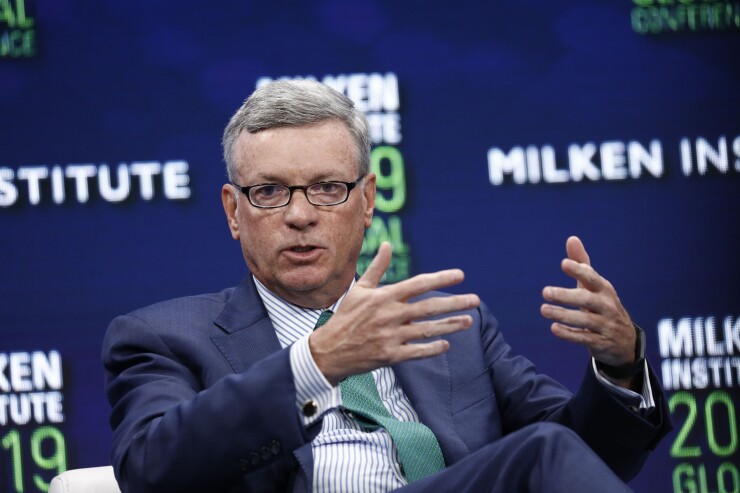Visa committed to spending more than $3 billion in just a few weeks to acquire the account aggregator Tink and the fintech Currencycloud, signaling its intention to be a key player in the global growth of trends like open banking and faster cross-border payments.
Tink's specialty in open banking — a data-sharing practice that's required by law in the European Union — gives Visa a role in facilitating fintech partnerships in other regions, including the U.S. This is complemented by Currencycloud's expertise in cross-border payments for challenger banks, another emerging category.
"It's early days but there will be an increase in adoption of open banking," said Alfred Kelly, chairman and CEO of Visa, during Tuesday's earnings call. "We're making progress there."
Kelly was referring to

Tink specializes in open banking, or data-sharing technology that allows consumers to access relationships with multiple companies, such as fintechs or payment apps, through their bank accounts. Open banking is required by the PSD2 regulation in Europe and is starting to accelerate in other countries, as partnerships between fintechs and banks become more popular.
Tink's open banking technology will allow Visa to improve its ability to support embedded payments, or using enrolled credentials to broaden financial services through partnerships between fintechs, banks and other third parties. Mastercard has also made progress in open banking, acquiring Finicity for about $825 million in 2020.
Tink has used its application programming interface to connect to more than 3,400 financial institutions including large banks and merchants in Europe, including NatWest, ABN Amro and BNP Paribas, as well as PayPal and Klarna.
Tink is mostly active in Europe, though Kelly plans to extend Tink's capabilities to other markets, where it can combine with Visa's merchants, issuers and expanding roster of
"Europe is the epicenter for open banking and that's what attracted us to Tink," Kelly said. "With Tink we see it going beyond those European markets, and there's no reason why we can't take the business to other parts of the world."
The Currencycloud deal focuses on cross-border payments. Currencycloud's clients include challenger banks such as Revolue, Monzo and Dwolla, companies that have roots in mobile payments but are in the midst of adding financial services.
During the earnings call, Kelly spotlighted Visa services such as B2B Connect, which recently entered a partnership with
"This provides the ability to drive cross-border payments without a correspondent banking network," Kelly said.
For the quarter that ended June 30, Visa reported net income of $2.6 billion, or $1.18 per share, up from $2.37 billion, or $1.07 per share the prior year. Adjusted for equity investments and other costs, net income was $3.3 billion, or $1.49 per share. That beat analysts' expectations of $1.34 per share, according to FactSet. Revenue rose to $6.1 billion, from $4.84 billion, better than the FactSet expectation of $5.86 billion.
Visa said it's preparing for "multiple quarters" of steady recovery from the impacts of the pandemic. The card brand plans to provide a more detailed long-term outlook for fiscal 2022 in its October earnings call.
The increase of coronavirus cases due to the delta variant is not a concern as of yet, the card brand reported. Mobility indexes, or measurements of travel and other movements, are stable even as infections climb, according to Visa. Payment flows also do not yet show signs of negative impact that can be tied to the delta variant or renewed restrictions, the card network said.
Global travel payments volume has reached about 50% of pre-pandemic levels and is still recovering, though unevenly in different markets, Visa reported. "If mobility can continue to improve we will return to something more closely resembling normal, and we will have a good recovery run," Kelly said.





